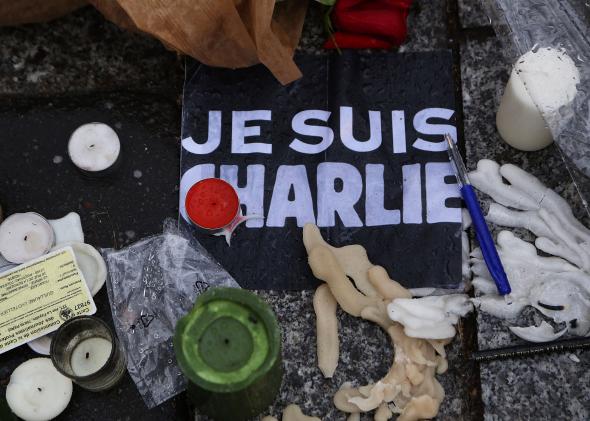Photo by Marc Piasecki/Getty Images
This piece was updated to reference Roxanne Gay and Gary Younge, writing for the Guardian.
Brother Karekin M Yarian, BSG, an Episcopal friar in San Francisco, has written a Facebook post on his complex feelings about Charlie Hebdo and the public response to the terrorist attacks in France.
His Facebook blog, written under the name PunkMonk, expresses sympathy for the victims of these attacks, but simultaneously explains why he can’t identify with the solidarity message of “Je suis Charlie”.
https://www.facebook.com/punk.monk.san.francisco/posts/10152984118717769
In response to criticism of his position, he’s also shared a Slate article he found relevant. The article, titled “Charlie Hebdo Is Heroic and Racist”, holds that we can regard Charlie Hebdo as heroic for standing up to threats of violence, but still condemn them for racism and mean-spirited attempts to provoke and inflame an oppressed minority within France.
From the Slate article:
This, in a country where Muslims are a poor and harassed minority, maligned by a growing nationalist movement that has used liberal values like secularism and free speech to cloak garden-variety xenophobia. France is the place, remember, where the concept of free expression has failed to stop politicians from banning headscarves and burqas. Charlie Hebdo may claim to be a satirical, equal-opportunity offender. But there’s good reason critics have compared it to “a white power mag.” As Jacob Canfield wrote in an eloquent post at the Hooded Utilitarian, “White men punching down is not a recipe for good satire.”
So Charlie Hebdo’s work was both courageous and often vile. We should be able to keep both of these realities in our minds at once, but it seems like we can’t.
It’s a complicated response to an enormous tragedy, and one that can be hard to express; the comments on both articles have been largely negative and suggest that in each case the respective author is blaming the victims of violence.
On the Guardian, acclaimed graphic artist Joe Sacco has posted a disturbing but appropriate cartoon response, titled On Satire. The imagery is disturbing but relevant. Sacco asks us to question what it is about Muslims in this time and place that some of them are unable to laugh off this satire, and suggests that asking that question is a better course of action than demanding that they accept our worldview and mockery of their faith. The cartoon, which may be disturbing, is available on the Guardian.
Dyab Abou Jahjah, activist and writer, had no difficulty in supporting free speech and the rights of Charlie Hebdo, but took the moment to express solidarity with Ahmed Merabet, the 42 year old Muslim police officer who was executed by the gunmen.
I am not Charlie, I am Ahmed the dead cop. Charlie ridiculed my faith and culture and I died defending his right to do so. #JesuisAhmed
— Dyab Abou Jahjah (@Aboujahjah) January 8, 2015
The Guardian covered his family, and their appeal to unity and peace, in a recent article.
From the Guardian article:
Ahmed Merabet, the police officer gunned down in the Charlie Hebdo attack, was killed in an act of barbarity by “false Muslims” his brother said in a moving tribute on Saturday, where he also appealed for unity and tolerance.
Speaking for a group of relatives gathered in Paris, Malek Merabet said the terrorists who ignored his brother’s plea for mercy as he lay wounded on the street may have shared his Algerian roots, but had nothing else in common.
“My brother was Muslim and he was killed by two terrorists, by two false Muslims,” he said. “Islam is a religion of peace and love. As far as my brother’s death is concerned it was a waste. He was very proud of the name Ahmed Merabet, proud to represent the police and of defending the values of the Republic – liberty, equality, fraternity.”
Has it been difficult for you to express yourself in talking about this tragedy? Do you feel comfortable navigating the complicated intersections of grief and caution, perhaps in pastoral situations, when talking with people effected emotionally by this tragedy?
Update:
Roxanne Gay and Gary Younge, both writing for the Guardian, have published similar pieces. Younge makes an argument against polarized debate, asking us to consider both points of view, and Gay asks us to consider nuance and thoughtfulness in our responses.
Posted by David Streever

